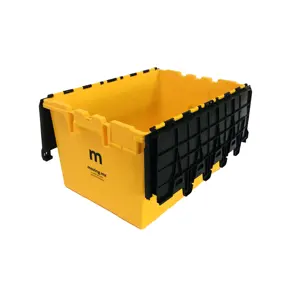Maximize Your Recycling Impact by Reusing Used Plastic Containers
The influence of recycling can be additional amplified by including the technique of reusing made use of plastic containers (bulk used plastic containers). The possibilities are substantial, and the advantages are far-reaching, making the venture of making best use of recycling effect via reusing plastic containers a worthwhile and interesting opportunity to discover.
Advantages of Reusing Plastic Containers
Recycling plastic containers not only decreases waste however likewise adds significantly to environmental sustainability. By choosing to recycle plastic containers rather than discarding them after a single usage, people can play an essential duty in minimizing the demand for new plastic production. This practice straight converts to a decrease in the intake of raw products, power, and sources needed for making brand-new containers.

Moreover, reusing plastic containers aids in decreasing the quantity of plastic waste that winds up in garbage dumps or contaminates our oceans and all-natural habitats. Plastic air pollution is a pressing international issue, and by extending the life-span of plastic containers through reuse, we can alleviate the adverse effect on the environment. Furthermore, reusing plastic containers can lead to a reduction in greenhouse gas exhausts connected with the manufacturing and transportation of brand-new plastic products.
Fundamentally, the simple act of recycling plastic containers can generate substantial environmental advantages by preserving resources, decreasing waste, and decreasing contamination, making it an impactful and sensible sustainability practice for individuals and communities alike.
Creative Upcycling Ideas for Containers
Considering the ecological advantages of extending the lifespan of plastic containers through reuse, discovering imaginative upcycling ideas presents a cutting-edge method to further sustainability initiatives. There are various inventive ways to repurpose utilized plastic containers, contributing to throw away decrease and promoting eco-conscious actions. An additional upcycling concept is to utilize large plastic containers, such as washing detergent containers, as storage containers for items like playthings, craft products, or also as makeshift planters for small indoor yards.
Tips for Correctly Cleansing Containers
Maintaining cleanliness in containers is essential for making certain health and extending their usability. To effectively clean used plastic containers, begin by emptying any type of continuing to be components and washing them with warm water to eliminate food fragments and residue. For containers with persistent discolorations or odors, develop a mixture of equivalent components water and vinegar or baking soda and water, and allow it sit our website for a few hours prior to scrubbing and rinsing extensively. Avoid utilizing harsh chemicals or abrasive scrubbers that can harm the plastic. In addition, make certain to dry out the containers completely prior to storing them to avoid mold and mildew growth. For containers with dilemmas or tiny openings, think about using a bottle brush or tooth brush to reach all areas (used bulk plastic containers). Routinely check the containers for indicators of wear and tear, such as fractures or staining, and change them if required to keep proper health criteria. By adhering to these cleansing tips, you can maximize the lifespan of your plastic containers and promote a healthier atmosphere.
Exactly How to Store Reused Containers Efficiently

Influence of Reusing on the Atmosphere
Reusing containers has a substantial favorable effect on the atmosphere by minimizing waste and preserving sources. When containers are reused instead of being discarded after a solitary usage, it helps in lowering the quantity of plastic waste that ends up in seas or garbage dumps.
By recycling plastic containers, the demand for brand-new manufacturing reductions, resulting in lowered discharges associated with the production and transportation of brand-new products. On the original site whole, the environmental advantages of reusing containers are considerable and play an essential function in advertising sustainability and decreasing the influence of plastic on the planet.
Verdict
To conclude, recycling used plastic containers can significantly decrease waste and decrease the environmental influence of single-use plastics. By creatively upcycling containers, appropriately cleaning them, and effectively keeping them, people can maximize their reusing initiatives and add to a more lasting future. Making a conscious effort to reuse plastic containers not only profits the setting yet also urges an extra eco-friendly way of life pop over to this site generally.
